With Cyber Monday passing, this signalled the timely arrival of the highly anticipated and acclaimed Internet Statistics from “Queen of the net”, Mary Meeker, partner at the venture capitalist firm Kleiner Perkins Caufield & Byers.
It is not all rosy however, as Mary gives us the lowdown on the US economy and its outlook; consumer confidence is below the 30 year average, stock markets are down, GDP expected to decelerate in 2012 and the biggest gap between revenue & expenses seen in peacetime. Given the highly interconnected nature of the modern global economy, we should assume everyone still needs to take note. However, let’s not all throw ourselves under the nearest train; there is still plenty to shout about. The recent rate of technological innovation globally is unprecedented and has triggered the “re-imagination” of nearly everything. It seems we are at the beginning of a new era and the best is yet to come; ubiquitous high speed wireless access combined with inexpensive devices & services, encouraging fearless & connected consumers and entrepreneurs.
Mobile is BIG and growing at an astounding rate, to the extent that more people are connected via mobile than land line, globally. In case you have been on the dark side of the moon, no surprises here really.
So, as promised, here are 12 key messages from Mary Meeker’s presentation:
1. 8% growth in global internet users (2.3 billion) in 2011
The steady global growth in Internet users is fuelled mainly by emerging markets. China is still on top with 513 million internet users in 2011 – and only 38% penetration (according to Webcertain’s 2012 Global Search & Social Report, China’s internet population now stands at 538 million – equivalent of nearly 40% internet penetration). A similar story for all other markets in the top 10, besides the US, means there is still plenty more growth to come.
Note: Click to enlarge images
2. 37% year-on-year growth in mobile 3G subscriptions globally
US, Japan and Korea are among the most connected countries in terms of 3G. Again, future growth is to be driven by emerging markets, such as China, Brazil and India which all have relatively low levels of 3G penetration and huge year-on-year growth; India’s being an astronomical 841%!
3. Mobile internet usage overtakes desktop usage in India in May 2012
Surely, a first of many mobile landmarks. Mary Meeker predicted back in November that the majority of internet traffic – globally – would be from mobile in Q2 2013.
4. Global iPad growth is three times that of iPhone
The rate of adoption of the iPad leaves its other ground-breaking siblings in the dust. Data published by IBM illustrating the overwhelming victory of the iPad during Black Friday / Cyber Monday seem to confirm that it has gone from strength to strength with nearly 50 million unit shipments in only 2 years.
5. Global Android phone adoption is four times iPhone – however, the “great Android disconnect” remains a problem
Of course, we should not forget Android, whose comprehensive outselling of iPhone has been well documented, despite comparing a premium product like the iPhone and low to mid-market Android devices.
However, despite a notable lead in global market share, Android continues to trail iOS when it comes to amount of internet traffic by OS. This “great Android disconnect” was once again confirmed during Black Friday, as shown below:
6. Global mobile traffic growing rapidly to 10% of total internet traffic
With an increasingly more connected population, combined with cheaper and more innovative devices, Mobile traffic represents 10% of the web, which is only set to be driven upwards given the enormous potential in emerging markets.
7. Apple App Store and iTunes driving (an estimated) 46 million downloads per day
An increasing appetite for low cost and an easily accessible supply of applications, combined with an equal appetite for developers to innovate – and at a reasonably low cost – no surprise that app downloads have soared and are fast accelerating.
8. Apps leading the way with rapid mobile monetisation globally
So, unsurprising that applications are raking most of the revenue, but to the extent of more than double all other mobile advertising revenues.
9. US mobile ad spend at 1% versus 10% of time spent
In the US, mobile usage has grown faster than the proportion of Advertising spend, which can be seen as a double edge sword. Advertisers can pick up new visitors cheaper than any other channel, however with lower eCPMs, this represents less income for publishers, albeit a 20 billion growth opportunity for mobile advertising in total.
With an eCPM x5 lower on mobile than Desktop in US, the situation should re-balance once more advertisers adopt mobile as a bigger part of their strategies.
10. Mobile growth sees traffic increase but constrained revenue growth due to lower CPCs
As shown in the estimates below, Google has seen clicks rise from 15.2 billion in Q1 2011 to 21.1 billion in Q1 2012 but also a drop in CPC from $.054 to $0.48 over the same period. Albeit the average CPC has dropped, the steep increase in clicks means that overall value of the mobile advertising market has grown.
11. Average revenue per user between 1.7 and 5 times lower on mobile than desktop
It seems that these monetisation issues have also impacted on Pandora, Tencent and Zynga:
12. Mobile ARPU can grow rapidly (as realised by Japanese mobile game maker GREE)
Fear not! Japan is among the most connected countries from a mobile perspective and companies such as mobile game maker, GREE, are leading the way. During the course of 2011, the average revenue from one of their games saw mobile exceed that of desktop, as shown below.
Mary enthused that, essentially all of this means that “Mobile monetisation has more going for it than early desktop monetisation.” Not only that, but the shifts in consumer habits and opportunities for entrepreneurs to innovate and create wealth and jobs, this could surely be the dose of medicine that the US and other faltering economies of world need for 2013 and beyond.
The full deck can be found here.
Now over to you: Which insights did you find particularly interesting from Mary Meeker’s presentation? Where do you see Mobile in 1 year from now? I welcome your insights and questions via the comments section below.

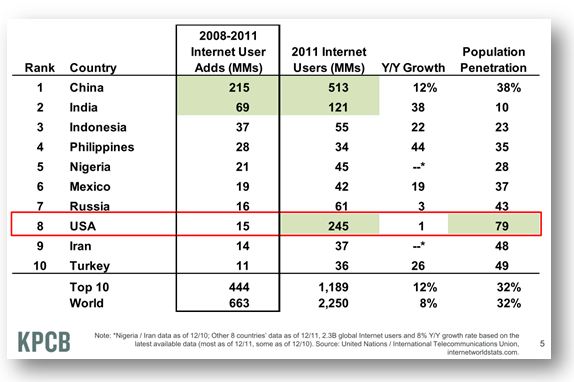
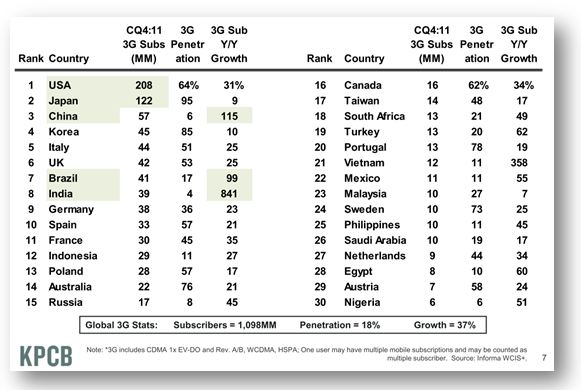
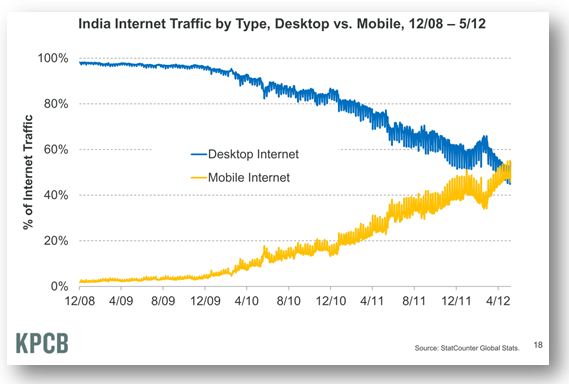
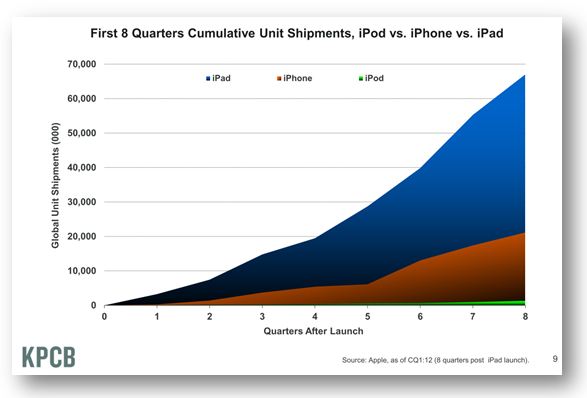
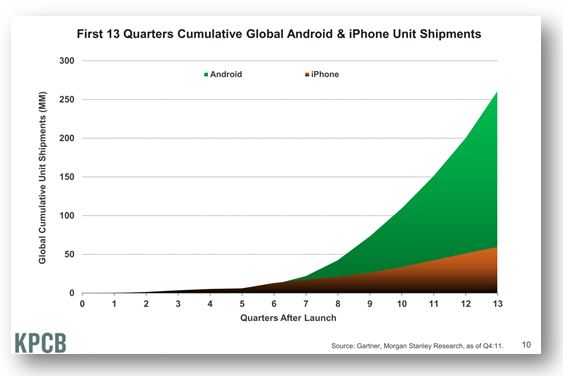
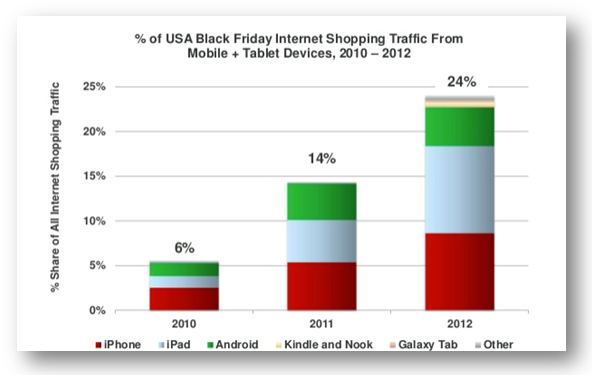
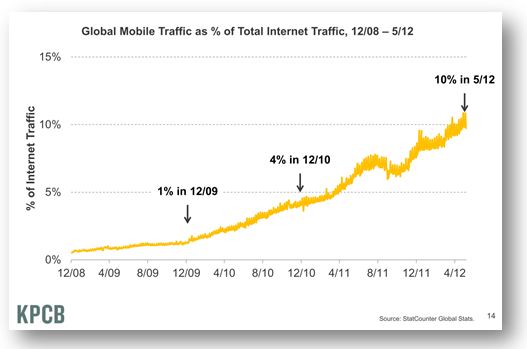
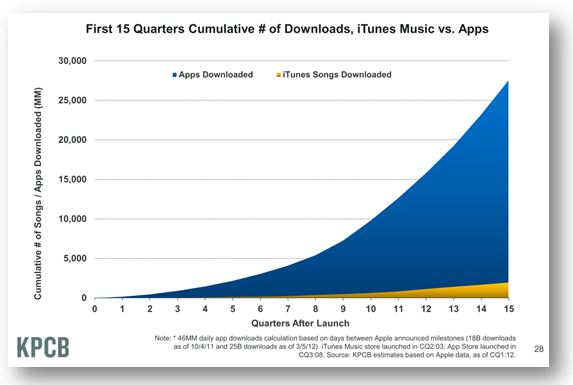
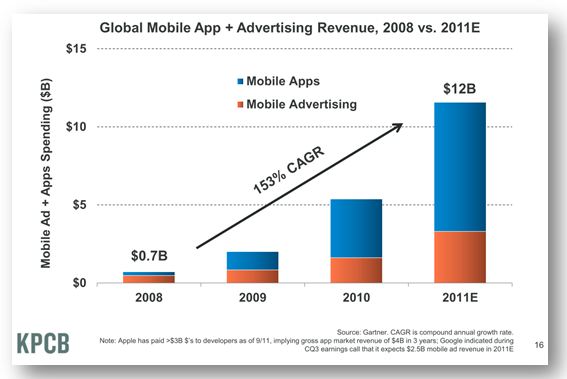
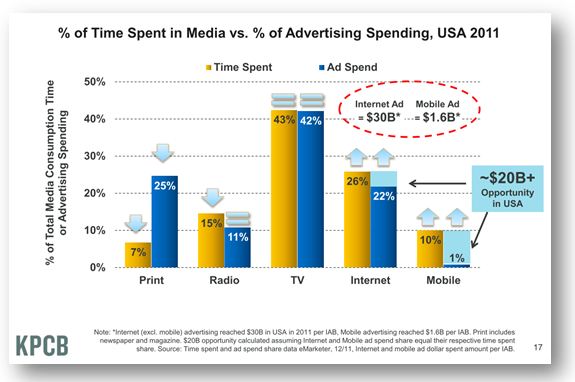
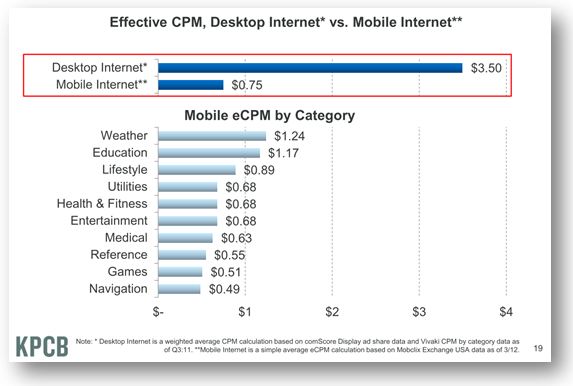
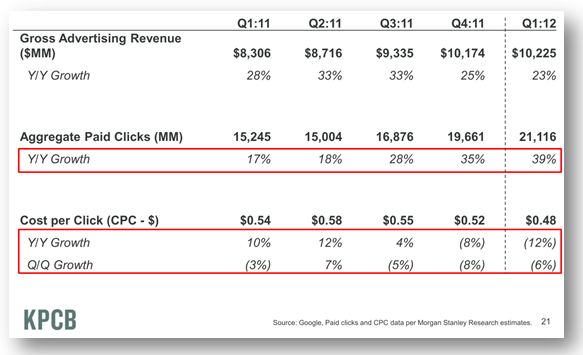
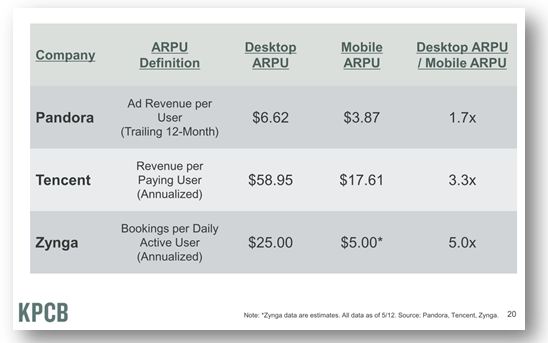
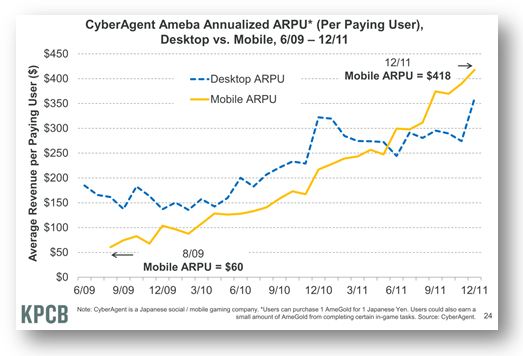







2 responses
Great article!!
Fascinating post! Mobile traffic is really kicking into high gear. I’m not sure entirely what the implications of this will be.